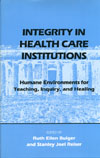The twelve essays in this stimulating volume, written by health care professionals and others working with the important issue of institutional ethics, focus on the world of academic health centers and provide rich, informed commentaries on significant problems integral to the character and work of those centers. Daniel Steiner demonstrates how the viability of independent research may be threatened by university liaisons with industry. Donald Frederickson traces the history of the National Institutes of Health response to the ethical challenges in clinical investigation and fetal research. Edmund Pellegrino recommends ways in which health-related institutions may translate their concern into action. Robert Coles examines the tensions between institutional and personal values in a very provocative way. Other directions are explored by essayists Roger Bulger, Stephen Toulmin, H. Tristram Engelhardt, Kim Dunn, Mitchell Rabkin, James Haughton, Lawrence Green, and the editors themselves.
Every essay in this wide-ranging collection reveals the implications and effects of institutional values. The end result is a clear picture of conflicts of values: ethical, social, economic, ethnic, cultural, and pedagogic. Integrity in Health Care Institutions points out the need for a deliberate attempt to sort out the values of institutions and, when they are fully and clearly displayed, to use priorities as a guide to satisfying the obligations of academic health centers to those who work within their walls; to the patients, students, scientists, and teachers they serve; and to society in general.
Physicians and nurses, hospital and university administrators, attorneys, sociologists, and everyone concerned about the moral interaction between institutions and individuals will want to read this book.
"…an interesting extension of what is now 'conventional' biomedical ethics to the conceptual and actual behavior and tone of the large health care institutions…The authors approach their task with remarkable diversity of perspective and style."—Richard M. Caplan, M.D., University of Iowa Hospitals and Clinics
"…between its cover is the powerful message: the time has come for institutions to face up to their conflict of values in order to live up to their responsibilities. The message is loud and clear and the book does a fine job of conveying it."—Alfred P. Fishman, M.D., Hospital of the University of Pennsylvania
"…many of these essays are outstanding in both content and style; all will be interesting to those concerned with health care in the 90s, particularly those who find themselves in the challenging positions of leadership of those vast and complex institutions, the academic health centers."—Paul J. Friedman, M.D., University of California, San Diego, School of Medicine
Preface
Introduction: Covenant, Leadership, and Value Formation in Academic Health Centers –Roger J. Bulger
The Role of Institutions:
Medical Institutions and Their Moral Constraints by Stephen Toulmin
Integrity, Humaneness, and Institutions in Secular Pluralist Societies by H. Tristram Engelhardt, Jr.
Institutions and the Shaping of Character by Robert Coles
The University:
Approaching Ethical Questions: A University Perspective by Daniel Steiner
Values and the Advance of Medical Science by Donald S. Fredrickson
Values in Teaching and Learning: A Student-Teacher Dialogue by Kim Dunn and Ruth Ellen Bulger
The Treatment of People:
Hospitals as Humane Corporations by Stanley Joel Reiser
The Hospital-Academic Health Center Interface: The Community of Practice and the Community of Learning by Mitchell T. Rabkin
Determinants of the Culture and Personality of Institutions by James G. Haughton
The Revival of Community and the Public Obligation of Academic Health Centers by Lawrence W. Green
Conclusion:
Values and Academic Health Centers: A Commentary and Recommendations by Edmund D. Pellegrino
Notes on Contributors

